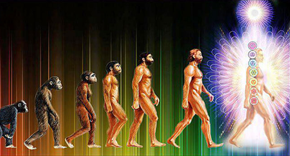by Sri Aurobindo: When the mind is entirely passive, then the force of Nature which works in the whole of animate and inanimate creation, has free play; for it is in reality this force which works in man as well as in the sun and star.  There is no doubt of this truth whether in Hinduism or in Science. This is the thing called Nature, the sum of cosmic force and energy, which alone Science recognises as the source of all work and activity. This also is the Prakriti of the Hindus to which under different names Sankhya and Vedanta agree in assigning a similar position and function in the Universe. But the immediate question is whether this force can act in man independently of man’s individual will and initiative. Must it always act through his volition or has it a power of independent operation? The first real proof which Science has had of the power of action independent of volition is in the phenomena of hypnotism. Unfortunately the nature of hypnotism has not been properly understood. It is supposed that by putting the subject to sleep the hypnotist is able in some mysterious and unexplained way to substitute his will for the subject’s. In a certain sense all the subject’s activities in the hypnotic state are the results of his own volition, but that volition is not spontaneous, it is used as a slave by the operator working through the medium of suggestion. Whatever the hypnotist suggests that the subject shall think, act or feel, he thinks, acts or feels, and whatever the hypnotist suggests that the subject shall become, he becomes.
There is no doubt of this truth whether in Hinduism or in Science. This is the thing called Nature, the sum of cosmic force and energy, which alone Science recognises as the source of all work and activity. This also is the Prakriti of the Hindus to which under different names Sankhya and Vedanta agree in assigning a similar position and function in the Universe. But the immediate question is whether this force can act in man independently of man’s individual will and initiative. Must it always act through his volition or has it a power of independent operation? The first real proof which Science has had of the power of action independent of volition is in the phenomena of hypnotism. Unfortunately the nature of hypnotism has not been properly understood. It is supposed that by putting the subject to sleep the hypnotist is able in some mysterious and unexplained way to substitute his will for the subject’s. In a certain sense all the subject’s activities in the hypnotic state are the results of his own volition, but that volition is not spontaneous, it is used as a slave by the operator working through the medium of suggestion. Whatever the hypnotist suggests that the subject shall think, act or feel, he thinks, acts or feels, and whatever the hypnotist suggests that the subject shall become, he becomes.
What is it that gives the operator this stupendous power? Why should the mere fact of a man passing into this sleep-condition suspend the ordinary reactions of mind and body and substitute others at the mere word of the man who has said to him, “Sleep”? It is sometimes supposed that it is the superior will of the hypnotist which overcomes the will of the other and makes it a slave. There are two strong objections to this view. It does not appear to be true that it is the weak and distracted will that is most easily hypnotised; on the contrary the strong concentrated mind forms a good subject. Secondly, if it were the operator’s will using the will of the subject, then the results produced must be such as the latter could himself bring about, since the capacities of the instrument cannot be exceeded by the power working through the instrument. Even if we suppose that the invading will brings with it its own force still the results produced must not exceed the sum of its capacity plus the capacity of the instrument. If they commonly do so, we must suppose that it is neither the will of the operator nor the will of the subject nor the sum of these two wills that is active, but some other and more potent force. This is precisely what we see in hypnotic performance.
What is this force that enables or compels a weak man to become so rigid that strong arms cannot bend him? that reverses the operations of the senses and abrogates pain? that changes the fixed character of a man in the shortest of periods? that is able to develop power where there was no power, moral strength where there was weakness, health where there was disease? that in its higher manifestations can exceed the barriers of space and time and produce that far-sight, far-hearing and far-thinking which shows mind to be an untrammelled agent or medium pervading the world and not limited to the body which it informs or seems to inform? The European scientist experimenting with hypnotism is handling forces which he cannot understand, stumbling on truths of which he cannot give a true account. His feet are faltering on the threshold of Yoga. It is held by some thinkers, and not unreasonably if we consider these phenomena, that mind is all and contains all. It is not the body which determines the operations of the mind, it is the mind which determines the laws of the body. It is the ordinary law of the body that if it is struck, pierced or roughly pressed it feels pain. This law is created by the mind which associates pain with these contacts, and if the mind changes its dharma and is able to associate with these contacts not pain but insensibility or pleasure, then they will bring about those results of insensibility or pleasure and no other. The pain and pleasure are not the result of the contact, neither is their seat in the body; they are the result of association and their seat is in the mind. Vinegar is sour, sugar sweet, but to the hypnotised mind vinegar can be sweet, sugar sour. The sourness or sweetness is not in the vinegar or sugar, but in the mind. The heart also is the subject of the mind. My emotions are like my physical feelings, the result of association, and my character is the result of accumulated past experiences with their resultant associations and reactions crystallising into habits of mind and heart summed up in the word, character.
These things like all the rest that are made of the stuff of associations are not permanent or binding but fluid and mutable, anityah sarvasamskarah. If my friend blames me, I am grieved; that is an association and not binding. The grief is not the result of the blame but of an association in the mind. I can change the association so far that blame will cause me no grief, praise no elation. I can entirely stop the reactions of joy and grief by the same force that created them.
They are habits of the mind, nothing more. In the same way though with more difficulty I can stop the reactions of physical pain and pleasure so that nothing will hurt my body. If I am a coward today, I can be a hero tomorrow. The cowardice was merely the habit of associating certain things with pain and grief and of shrinking from the pain and grief; this shrinking and the physical sensations in the vital or nervous man which accompany it are called fear, and they can be dismissed by the action of the mind which created them. All these are propositions which European Science is even now unwilling to admit, yet it is being proved more and more by the phenomena of hypnotism that these effects can be temporarily at least produced by one man upon another; and it has even been proved that disease can be permanently cured or character permanently changed by the action of one mind upon another. The rest will be established in time by the development of hypnotism.
The difference between Yoga and hypnotism is that what hypnotism does for a man through the agency of another and in the sleeping state, Yoga does for him by his own agency and in the waking state. The hypnotic sleep is necessary in order to prevent the activity of the subject’s mind full of old ideas and associations from interfering with the operator. In the waking state he would naturally refuse to experience sweetness in vinegar or sourness in sugar or to believe that he can change from disease to health, cowardice to heroism by a mere act of faith; his established associations would rebel violently and successfully against such contradictions of universal experience. The force which transcends matter would be hampered by the obstruction of ignorance and attachment to universal error.
The hypnotic sleep does not make the mind a tabula rasa but it renders it passive to everything but the touch of the operator. Yoga similarly teaches passivity of the mind so that the will may act unhampered by the samskaras or old associations.
It is these samskaras, the habits formed by experience in the body, heart or mind, that form the laws of our psychology. The associations of the mind are the stuff of which our life is made. They are more persistent in the body than in the mind and therefore harder to alter. They are more persistent in the race than in the individual; the conquest of the body and mind by the individual is comparatively easy and can be done in the space of a single life, but the same conquest by the race involves the development of ages. It is conceivable, however, that the practice of Yoga by a great number of men and persistence in the practice by their descendants might bring about profound changes in human psychology and, by stamping these changes into body and brain through heredity, evolve a superior race which would endure and by the law of the survival of the fittest eliminate the weaker kinds of humanity. Just as the rudimentary mind of the animal has been evolved into the fine instrument of the human being so the rudiments of higher force and faculty in the present race might evolve into the perfect buddhi of the Yogin.
Yo yacchraddhah sa eva sah. According as is a man’s fixed and complete belief, that he is,–not immediately always but sooner or later, by the law that makes the psychical tend inevitably to express itself in the material. The will is the agent by which all these changes are made and old samskaras replaced by new, and the will cannot act without faith. The question then arises whether mind is the ultimate force or there is another which communicates with the outside world through the mind. Is the mind the agent or simply the instrument? If the mind be all, then it is only animals that can have the power to evolve; but this does not accord with the laws of the world as we know them. The tree evolves, the clod evolves, everything evolves. Even in animals it is evident that mind is not all in the sense of being the ultimate expression of existence or the ultimate force in Nature. It seems to be all only because that which is all expresses itself in the mind and passes everything through it for the sake of manifestation. That which we call mind is a medium which pervades the world. Otherwise we could not have that instantaneous and electrical action of mind upon mind of which human experience is full and of which the new phenomena of hypnotism, telepathy etc. are only fresh proofs. There must be contact, there must be interpenetration if we are to account for these phenomena on any reasonable theory. Mind therefore is held by the Hindus to be a species of subtle matter in which ideas are waves or ripples, and it is not limited by the physical body which it uses as an instrument.
There is an ulterior force which works through this subtle medium called mind.
An animal species develops, according to the modern theory, under the subtle influence of the environment. The environment supplies a need and those who satisfy the need develop a new species which survives because it is more fit. This is not the result of any intellectual perception of the need nor of a resolve to develop the necessary changes, but of a desire, often though not always a mute, inarticulate and unthought desire. That desire attracts a force which satisfies it.
What is that force? The tendency of the psychical desire to manifest in the material change is one term in the equation; the force which develops the change in response to the desire is another. We have a will beyond mind which dictates the change, we have a force beyond mind which effects it. According to Hindu philosophy the will is the Jiva, the Purusha, the self in the anandakosha acting through vijñana, universal or transcendental mind; this is what we call spirit. The force is Prakriti or Shakti, the female principle in Nature which is at the root of all action. Behind both is the single Self of the universe which contains both Jiva and Prakriti, spirit and material energy. Yoga puts these ultimate existences within us in touch with each other and by stilling the activity of the samskaras or associations in mind and body enables them to act swiftly, victoriously, and as the world calls it, miraculously. In reality there is no such thing as a miracle; there are only laws and processes which are not yet understood.
Yoga is therefore no dream, no illusion of mystics. It is known that we can alter the associations of mind and body temporarily and that the mind can alter the conditions of the body partially. Yoga asserts that these things can be done permanently and completely. For the body conquest of disease, pain and material obstructions, for the mind liberation from bondage to past experience and the heavier limitations of space and time, for the heart victory over sin and grief and fear, for the spirit unclouded bliss, strength and illumination, this is the gospel of Yoga, is the goal to which Hinduism points humanity.









































